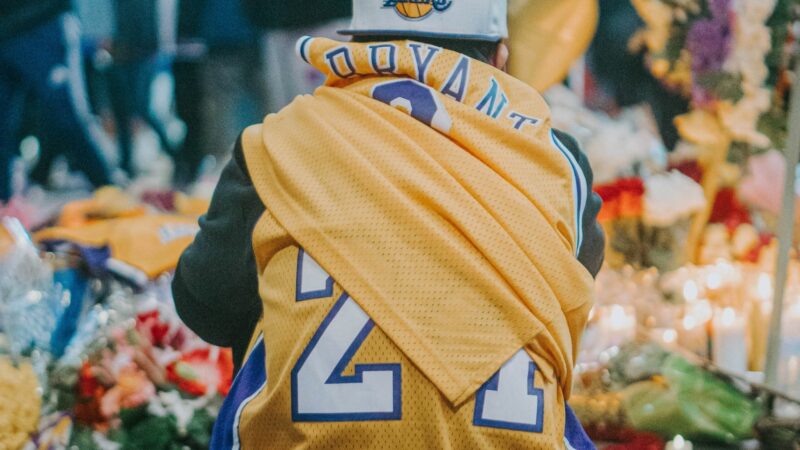Photo by: Fred Kearney on Unsplash
In the hours after news of Kobe’s death broke, I witnessed the sheer magnitude of one man’s impact on a community of communities. Throughout my neighborhood in Thousand Oaks, I saw kids with basketballs, repping the iconic #24 jersey. They didn’t need hoops or a playground—some practiced shots in the air, some dribbled aimlessly in the streets as though the repetitious sound of the ball hitting the pavement would surface answers, and some just simply sat and wept. The pain and shock were unavoidable.
As a parent, youth basketball coach, therapist, grief researcher, and life-long basketball fanatic, I struggled in the moment for a way to talk to my own kids about this tragic event. I also struggled to know how to console my first-generation Latino neighbor who, while wearing his Lakers jersey and hugging his basketball, met my gaze as we seemed to communicate the same wordless pain: “I don’t understand.”
If you are a parent, coach, mentor, teacher, or caregiver to a child or adolescent looking for facts, tips, and resources to help you talk to youth about grief, then this post is for you. In today’s post, I will lay out some basic foundational communication points. Tomorrow, we will dive in deeper and provide more tangible facts and resources.
A Generational Legacy
Before we can be comfortable talking to youth about trauma and grief, we must be aware of our own reactions. Much of how youth react to grief is partially dependent on how we react. Let’s pause first and acknowledge that we, too, are a generation of Kobe. Ask yourself, “What was his impact on me?” Kobe’s legacy transcends two decades of witnessed greatness on the court. He was at the precipice of what was to be his second and most impactful life’s contribution. Above all, family was the fabric that wove him together with his community. He was devout to his faith and a fiercely dedicated father who, I believe, in his final moments was hugging and kissing the forehead of his beautiful daughter. You can’t reflect on his legacy without recognizing that Kobe was a part of you, too.
Talking to Your Youth About Death
How youth interpret and express grief is a function of their developmental stage, cognitive abilities, and previous life experiences. Your goal is to be a companion with them through this process. An initial impulse may be to take away their pain, to try to make them feel better. However, our own well-meaning attempts at softening the suffering of our loved ones may be communicating to them that death makes us uncomfortable. Don’t redirect their grief. Walk with them. Most reactions to trauma are normal responses to an abnormal and often unexpected event. No two people are going to react the same to a common event.
What can I do?
Ask your youth, “What do you need from me?” or “How can I support you?” Don’t say, “Why are you so upset?” or “I know how you feel.” Be comfortable with not having the answers, be comfortable with silence, and be comfortable with another’s sadness.
Some of you may ask, “Can my child really be this distraught over the death of someone they never met?” That answer is a resounding YES! We can’t necessarily know what Kobe’s iconicism meant to your child. Feelings of intense grief after the death of a legendary public figure such as Kobe is common. This is, in part, because we form attachments and connections to celebrities. They become symbols of inspiration, hope, and purpose. Forming relationships with celebrities is easier now more than ever with certain social media platforms such as Instagram and Snapchat. Our youth have the ability to connect with their idols daily, becoming a part of their daily life and routine. A factor in how one grieves is their proximity to the one(s) who have died. You can never know what an icon meant to your child if you don’t ask. Treating the death as far removed can come across as dismissive and inhibit the connection you’re trying to facilitate.
What can I do?
Show interest. Ask your child, “Do you want to watch an old game together?” or “What did Kobe mean to you?” or “What did you feel when you first heard he died?” Asking these facilitating questions allows the space for your child to express their own personal connection to the star.
Remember
Grief is complex and grief is individual. Acknowledge and honor the feelings that are being felt. Trust that healing will come in time, and each person will dictate that time. Encourage conversation and connection. Hug your children a little longer. Don’t be the first one to let go.
Continue Exploring

Blog
A Practice: Digging Deep to Forgive
Becoming a more forgiving person is a process. If you are ready to start healing, ask yourself the following questions. Make sure you have the support you need.

Emotions
Discovering Joy
This post is based upon an interview between Psychology Today and Dr. Pam King

Emotions
Why You Need to Make Time for Play
You might be surprised about the benefits of play for your wellbeing and your spiritual health. Here's how to get more in your life.
